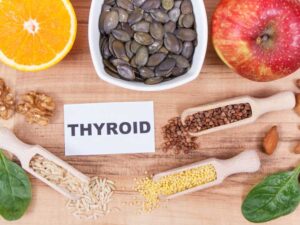If you’ve been diagnosed with hypothyroidism, you certainly know how much this condition can affect your quality of life. But have you realized how your diet can help improve or worsen your symptoms?
While most people with hypothyroidism need to take thyroid hormone replacement medication to replace thyroid hormones, there’s another efficient way to boost your thyroid. Think about what you eat.
That’s because certain nutrients are essential for optimal thyroid function, while others can trigger symptoms of an underactive thyroid.
In today’s guide, we’ll show you how diet can be a powerful weapon against hypothyroidism. We’ll delve into thyroid function, explore the causes and symptoms of hypothyroidism, and provide a diet plan to support your overall health.
Whether you’re newly diagnosed or seeking to refine your dietary approach, our ultimate guide on the best diets for common thyroid problems will empower you. You’ll have the knowledge and resources needed to navigate this condition with confidence and vitality.
Understanding the Thyroid and Why Your Food Choices Matter
Diet: Hypothyroidism-Friendly Nutrients
Best Diet Choices for Thyroid Health
Diet: Foods to Avoid with Hypothyroidism
How to Lose Weight with Hypothyroidism
The Best Diet for Hypothyroidism: Creating Your Diet Plan
What is Hypothyroidism?
Hypothyroidism – or underactive thyroid disease – is when the thyroid gland fails to produce enough thyroid hormones to meet your body’s needs.
The thyroid, a butterfly-shaped gland located in the front of your neck, is vital for regulating metabolism, energy production, body temperature, heart rate, and many other body functions.
So, a thyroid disease or any disruption in the gland can lead to various health issues – including hypothyroidism. This significantly affects your overall health and wellbeing.
Main Causes of Hypothyroidism
The most common cause of hypothyroidism is Hashimoto’s Thyroiditis. This is an autoimmune disease in which your immune system mistakenly attacks your thyroid gland, leading to inflammation and gradual destruction of thyroid tissue. This autoimmune hypothyroidism impairs the gland’s ability to produce hormones.
Another common reason is Postpartum Thyroiditis. This is a condition that affects some women shortly after childbirth. It involves inflammation of the thyroid gland, which can initially cause hyperthyroidism (overactive thyroid) – followed by hypothyroidism as the inflammation subsides.
In addition to these two common causes, diet also plays a role in triggering hypothyroidism, as some nutrients like iodine, selenium, zinc, and vitamin D are crucial for synthesizing hormones produced by your thyroid.
Other less common causes include thyroid surgery, radiation therapy to the neck area, certain medications, congenital thyroid disorders, and pituitary gland disorders affecting hormone regulation.
Hypothyroidism Symptoms
Regardless of the cause, hypothyroidism can lead to a range of symptoms that affect your overall health. Here are the most common ones:
- Fatigue and weakness
- Weight gain or difficulty losing weight despite maintaining a healthy diet and exercise
- Cold intolerance
- Constipation
- Dry skin and hair
- Muscle weakness and joint pain
- Elevated cholesterol levels
- Menstrual irregularities
- Mood changes, depression, memory problems, and difficulty concentrating
- Swelling, particularly in the face, hands, feet, and ankles
Early detection and appropriate management, including medication and lifestyle modifications such as dietary changes, are essential for effectively managing hypothyroidism and minimizing its impact on your health.
Understanding the Thyroid and Why Your Food Choices Matter
As mentioned, the thyroid gland regulates metabolism and energy production by producing thyroid hormones – primarily thyroxine (T4) and triiodothyronine (T3).
These hormones influence many physiological processes within your body, including heart rate, body temperature, digestion, and the metabolism of carbohydrates, fats, and proteins.
And that’s why your diet matters!
Dietary choices can significantly impact your thyroid and hormone production. Therefore, including various nutrient-dense foods can help support optimal thyroid function, while ultra-processed foods, for example, can trigger symptoms.
So, to promote your overall health, try to include in your hypothyroidism diet foods that are rich in the following nutrients and minerals.
Diet: Hypothyroidism-Friendly Nutrients
Iodine
Iodine is an essential mineral required for synthesizing thyroid hormones. This means your thyroid cannot produce enough hormones without adequate iodine intake. And iodine deficiency may lead to hypothyroidism.
In fact, low iodine intake is one of the main reasons for hypothyroidism in regions where the soil is deficient in this mineral. This can sometimes lead to widespread iodine deficiency among the population, resulting in an increased risk of hypothyroidism. Fortunately, that’s not the case in the US, where we primarily consume iodized salt.
However, that does not mean you should overconsume it, as excessive iodine can also disrupt thyroid function.
Keep it reasonable to maintain an optimal level of iodine in your body and try to increase your consumption of iodine-rich foods like seafood, eggs, and sea vegetables such as kelp or kelp flakes, dulse, and nori (seaweed) if you have hypothyroidism.
Selenium
This is another essential nutrient for the thyroid, as it converts T4 to the more active form of thyroid hormone, T3, within the body. Selenium also helps protect the thyroid from oxidative damage.
So, make sure you include selenium supplements and selenium-rich foods such as Brazil nuts, seafood, and organ meats in your diet to improve thyroid function.
Tyrosine
Tyrosine is an amino acid that serves as a building block for thyroid hormones. So, protein-rich foods containing tyrosine, such as meat, fish, and legumes, can support thyroid hormone synthesis and your thyroid health.
Vitamin D and B12
Deficiencies in essential vitamins and minerals, such as vitamin D and vitamin B12, can negatively affect thyroid function and hormone production. Iron deficiency can also impact thyroid health.
Ensuring a balanced diet that provides adequate amounts of these nutrients is essential for supporting your thyroid. You can also increase your intake by taking vitamin B, D, iron, and calcium supplements.
Anti-inflammatory foods
Chronic stress and inflammation can impair your thyroid by disrupting hormone production and signaling pathways. Consuming a diet rich in anti-inflammatory foods, such as fruits, vegetables, healthy fats, and omega-3 fatty acids, can help reduce inflammation and support thyroid function.
Best Diet Choices for Thyroid Health
These diets for underactive thyroid will give you many of the foods we mention above that you can enjoy and benefit from:
Mediterranean Diet – The Mediterranean diet is rich in anti-inflammatory foods, healthy fats, and essential nutrients that support overall health. It includes whole grains, vegetables, fruits, legumes, nuts, seeds, and lean proteins, particularly fish. This diet helps reduce inflammation, enhances thyroid function, promotes sustainable weight loss, and improves heart health, while stabilizing blood sugar levels.
Gluten-Free Diet – A gluten-free diet avoids foods that can worsen hypothyroid symptoms by disrupting gut health. Gluten can trigger an immune response, especially in those with autoimmune thyroid conditions, leading to inflammation and further thyroid dysfunction. By eliminating gluten, this diet supports better digestion, nutrient absorption, and helps stabilize metabolism and promote weight loss.
Anti-inflammatory Diet – An anti-inflammatory diet helps reduce chronic inflammation, which can disrupt thyroid hormone production and metabolic function. By focusing on fruits, vegetables, omega-3-rich foods, and healthy fats, this diet promotes thyroid health and immune function. It supports weight loss, stabilizes blood sugar, and enhances mental clarity, energy levels, and overall hormonal balance.
Diet: Foods to Avoid with Hypothyroidism
It’s becoming obvious that when you have hypothyroidism you should also
avoid certain foods in your diet.
While there’s no one-size-fits-all approach when dealing with thyroid, some foods may exacerbate symptoms or interfere with thyroid function and hormone production in some people with hypothyroidism.
You can feel more positive by looking on this “avoid” option as choosing an anti-inflammatory diet, a gluten-free diet, or a Mediterranean diet. These choices also help you with weight loss (see below for more on that).
So, here are some foods to avoid for Hashimoto’s thyroiditis and hypothyroidism.
Cruciferous vegetables
Some cruciferous vegetables, such as broccoli, cabbage, cauliflower, Brussels sprouts, and kale, in raw form, contain compounds known as goitrogens. These compounds can interfere with thyroid hormone production when consumed in large amounts. For this reason, some doctors recommend consuming them moderately if you have an underactive thyroid.
They’re safer to eat when cooked, as this deactivates the goitrogenic compounds, reducing their impact on thyroid function.
Soy-based foods
Soy contains compounds called isoflavones, which can impact some individuals’ thyroid function, hormone synthesis, and absorption.
If you’re taking hypothyroidism medication such as levothyroxine, for example, make sure to take it on an empty stomach and avoid any soy products for an hour – this is because it can be harder to absorb the medication in the presence of soy.
While moderate consumption of soy foods, such as tofu, soy milk, and edamame, may not pose a problem in general, some people with hypothyroidism may benefit from limiting their intake. Discuss your unique case with your healthcare provider.
Gluten-containing foods
Some people with autoimmune thyroiditis and Hashimoto’s thyroiditis may have an autoimmune reaction to gluten, a protein found in wheat, barley, rye, and related grains.
Research suggests a relationship between gluten and thyroid, where gluten consumption may trigger inflammation and exacerbate thyroid symptoms, especially for those with celiac disease or gluten sensitivity. So, if you have hypothyroidism, you may benefit from a gluten-free diet.
Processed foods
Processed foods, including sugary snacks, refined carbohydrates, and foods high in unhealthy fats, can contribute to inflammation, weight gain, and insulin resistance. This negatively impacts thyroid function. Aim to minimize processed foods and focus on whole, nutrient-dense foods instead.
Alcohol and caffeine
In some individuals with thyroid conditions, alcohol and caffeine can interfere with thyroid hormone production and absorption, disrupt sleep patterns, and exacerbate symptoms such as anxiety and palpitations. Limiting or avoiding alcohol and caffeine intake may help alleviate these symptoms.
Despite these general rules, individual responses to these foods can vary, and not everyone with Hashimoto’s thyroiditis or hypothyroidism will need to avoid all these foods.
Make sure you work with your doctor or registered dietitian to develop a personalized dietary plan that supports optimal thyroid health based on your individual needs and preferences.
Now, before diving into a diet plan for hypothyroidism, let’s first explore some strategies for one of the most common diet concerns of people with hypothyroidism: how to lose weight.
How to Lose Weight with Hypothyroidism
If you have hypothyroidism, chances are that you’ve asked yourself this question way too often. And the answer is not so simple.
Losing weight with hypothyroidism can be challenging due to the slower metabolism and other factors associated with the condition. However, achieving your weight loss goals with the right approach is still possible. Here are some strategies to consider:
Thyroid medication
If you have hypothyroidism, it’s essential to ensure that your thyroid hormone levels are properly regulated with thyroid medication prescribed by your healthcare provider to improve metabolism and energy levels. This will help you lose weight more easily.
Balanced diet
A diet plan for weight loss with hypothyroidism can help. Focus on consuming a balanced diet that includes a variety of nutrient-dense foods such as fruits, vegetables, lean proteins, whole grains, and healthy fats.
Portion control
Pay attention to portion sizes and avoid overeating, even while consuming healthy foods.
Regular exercise
Incorporate regular physical activity into your routine, aiming for a combination of cardiovascular exercise, strength training, and flexibility exercises.
Manage stress
Chronic stress can exacerbate symptoms of hypothyroidism and contribute to weight gain. Practice stress-reducing techniques such as mindfulness meditation, deep breathing exercises, or yoga to help manage stress levels and support weight loss efforts.
Get enough sleep
Prioritize getting adequate sleep each night. Aim for 7-9 hours of quality sleep. Poor sleep quality can disrupt hormone balance, increase cravings for unhealthy foods, and negatively impact metabolism. This makes weight loss more challenging.
Now, let’s get to the point: how to balance thyroid hormones with diet…
What role does hydration play in managing hypothyroidism?
Staying hydrated is essential for people with hypothyroidism, as it helps regulate metabolism, supports digestion, and improves thyroid function. Proper hydration can boost energy levels and support a healthy metabolism, which is crucial for a diet to improve thyroid function. Additionally, hydration can help manage symptoms like fatigue, constipation, and dry skin, all of which are common in individuals with hypothyroidism.
How can I manage cravings and emotional eating with hypothyroidism?
Managing cravings and emotional eating with hypothyroidism involves adopting mindful eating habits and balanced meals. Low thyroid function can disrupt appetite regulation, leading to increased cravings, especially for carbohydrates and sugar.
A thyroid diet plan for weight loss can help by including nutrient-dense foods and focusing on portion control. Practicing stress-reduction techniques like meditation or yoga can also curb emotional eating, helping individuals stay on track with their diet plan for weight loss with hypothyroidism.
How can diet influence mental health in individuals with hypothyroidism?
Diet plays a crucial role in mental health for individuals with hypothyroidism. Nutrients like selenium, omega-3 fatty acids, and B vitamins support brain function and can help alleviate mood swings, anxiety, and depression. Balancing blood sugar levels with a whole food-based hypothyroidism meal prep can also stabilize mood and promote mental clarity. A balanced diet supports overall emotional stability and cognitive function, which is vital for understanding what is a good diet for underactive thyroid.
Do different cooking oils affect thyroid health?
Yes, different cooking oils can impact thyroid health. Healthy oils like olive oil and coconut oil, rich in monounsaturated fats and medium-chain triglycerides, support thyroid function and reduce inflammation, which is important in any diet to improve thyroid function. In contrast, oils high in omega-6 fatty acids, such as soybean oil, can promote inflammation, potentially disrupting thyroid hormone production. Choosing the right oils is key for supporting thyroid health and promoting a healthy thyroid diet plan for weight loss.
The Best Diet for Thyroid Disease: Creating Your Diet Plan
Having hypothyroidism can be a burden, but you can significantly improve your quality of life just by making mindful choices and adopting a diet that focuses on supporting thyroid function.
Follow this step-by-step guide to creating your personalized diet plan for thyroid health:
Step 1: Assess Your Caloric Needs
Calculate your estimated daily calorie needs based on age, gender, weight, height, activity level, and weight loss goals. You can use online calculators or consult a functional nutritionist for personalized guidance.
Step 2: Determine Macronutrient Distribution
Aim for a balanced macronutrient distribution that includes carbohydrates, proteins, and fats, generally distributed as:
Carbohydrates: 45-65% of total calories
Proteins: 10-35% of total calories
Fats: 20-35% of total calories
Adjust macronutrient ratios based on your preferences and goals.
Step 3: Identify Food Sensitivities and Preferences
Identify any food sensitivities, allergies, or intolerances you may have, and avoid or limit those foods accordingly. Consider your preferences and dietary restrictions when planning meals and adopt a gluten-free diet if you are gluten-sensitive or have celiac disease.
Step 4: Plan Your Meals
Aim for balanced meals that include a variety of nutrient-dense foods from all food groups.
Incorporate foods that support your thyroid, such as:
- iodine-rich foods (seafood, iodized salt)
- selenium-rich foods (Brazil nuts, fish, eggs),
- foods high in fiber (fruits, vegetables, whole grains)
Include lean proteins, healthy fats, and complex carbohydrates to support energy levels and satiety. Focus on whole, minimally processed foods and limit or avoid refined sugars and artificial additives.
Ready to Take Control of Your Hypothyroidism Diet?
Discover how Nava’s functional nutrition solutions can help you address hormone imbalances and optimize thyroid function for a healthier, more vibrant you.
At Nava Health, we understand the importance of a balanced thyroid for overall wellbeing. Our services are tailored to your unique needs, helping you achieve optimal thyroid function and reclaim vitality.
Our team of functional nutritionists specializes in hormone imbalances. They will comprehensively evaluate your thyroid, assess your thyroid antibodies to identify imbalances, and target the root causes of your symptoms to help you find the best diet for hypothyroidism.
Take the first step toward better hypothyroidism management and overall wellness with a personalized diet.









